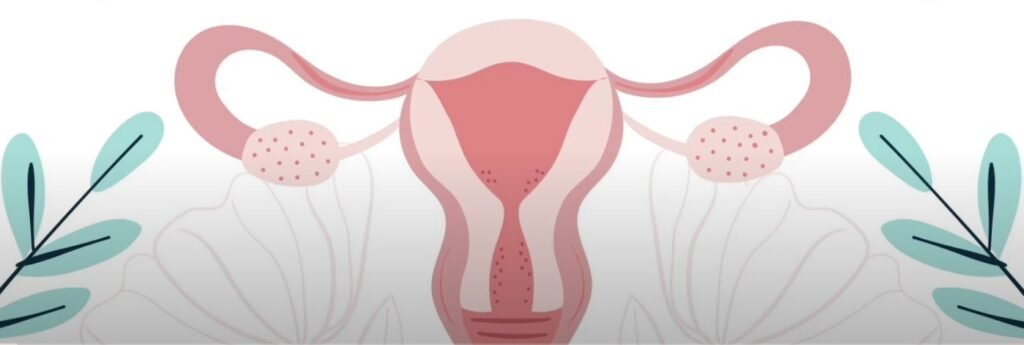Premenstrual syndrome (PMS) encompasses a range of symptoms recurring cyclically before menstruation, affecting approximately 40% of menstruating women, particularly those over 30 years old. This article delves into the symptoms, diagnosis, causes, and treatment options for PMS, providing valuable insights and practical advice for managing this common condition.
Symptoms of PMS
PMS typically manifests two to seven days before menstruation, characterized by various physical and emotional symptoms. These include:
- Headaches: Often accompanied by vomiting.
- Depression and Irritability: A pervasive sense of gloom and mood swings.
- Tension Headaches: Common, with some experiencing migraines.
- Breast Tenderness: Severe discomfort in the breast area.
- Abdominal Bloating: Accompanied by edema in ankles and hands.
- Cravings: Particularly for sweet foods.
- Less Common Symptoms: Exacerbation of epilepsy, dizziness, backache, hoarse voice, greasy hair, acne, and allergic reactions.
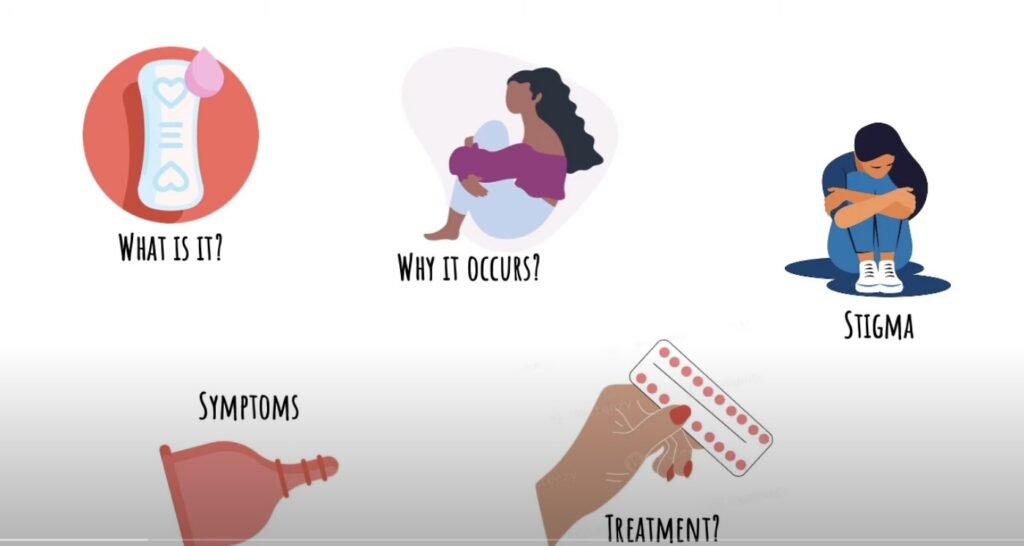
Emotional and Behavioral Symptoms:
- Anxiety, restlessness, or feeling on edge
- Unusual anger and irritability
- Changes in appetite and food cravings, especially for sweets
- Sleep disturbances and fatigue
- Sadness, tearfulness, or sudden mood swings
- Decreased sex drive and difficulty concentrating
When Do PMS Symptoms Begin?
PMS symptoms typically start after ovulation and persist until a few days after menstruation begins. The average menstrual cycle lasts about 28 days, with ovulation occurring around day 14. Symptoms can vary in severity and duration but often follow this cyclical pattern.
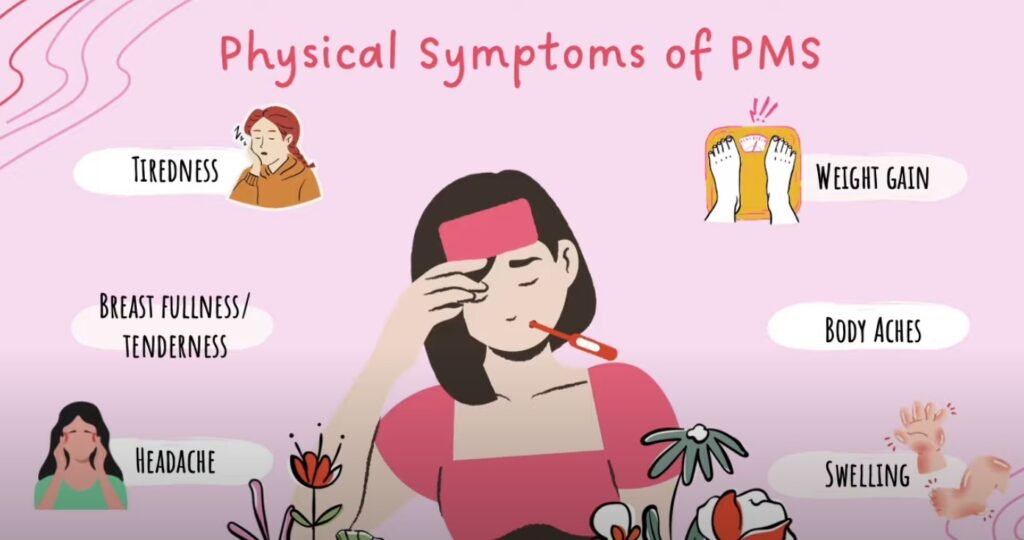
What Causes PMS?
While the exact cause of PMS remains unclear, several factors may contribute to its development:
Hormonal Fluctuations:
Changes in estrogen and progesterone levels during the menstrual cycle may influence mood, emotions, and physical symptoms associated with PMS.
Neurotransmitter Imbalances:
Disruptions in neurotransmitters like serotonin and norepinephrine can impact mood regulation and contribute to PMS symptoms, such as depression and anxiety.
Existing Mental Health Conditions:
Individuals with underlying mental health conditions like depression or anxiety may be more susceptible to experiencing severe PMS symptoms or premenstrual dysphoric disorder (PMDD).
Lifestyle Factors:
Unhealthy habits such as smoking, consuming high-fat and sugary foods, lack of physical activity, poor sleep quality, and excessive alcohol consumption can exacerbate PMS symptoms.
PMDD: A Severe Form of PMS
Premenstrual dysphoric disorder (PMDD) is a more severe form of PMS characterized by intense emotional and physical symptoms. It can significantly impact daily functioning and quality of life. PMDD may require specialized treatment approaches, including therapy and medication.
Seeking Medical Assistance
If PMS symptoms significantly disrupt your daily routine or persist throughout the month, seeking medical assistance is essential. Healthcare professionals can provide a thorough evaluation, diagnose PMS or PMDD, and recommend appropriate treatment options based on individual needs.
Diagnosis and Causes
Diagnosing PMS relies on a clear, recurrent relationship between menstrual cycles and symptom onset, often documented through personal diaries maintained over several cycles. While the exact cause of PMS remains elusive, some experts attribute it to hormonal imbalances, emotional stress, and dietary deficiencies, particularly of vitamin E and vitamin B.
Treatment Options
Treatment for PMS varies based on symptom severity. Mild symptoms may be alleviated through lifestyle adjustments, such as avoiding stressful situations, moderating fluid intake, and educating family members about the condition. Dietary modifications, including the elimination of refined carbohydrates, sugars, caffeine, and spicy foods, are recommended.
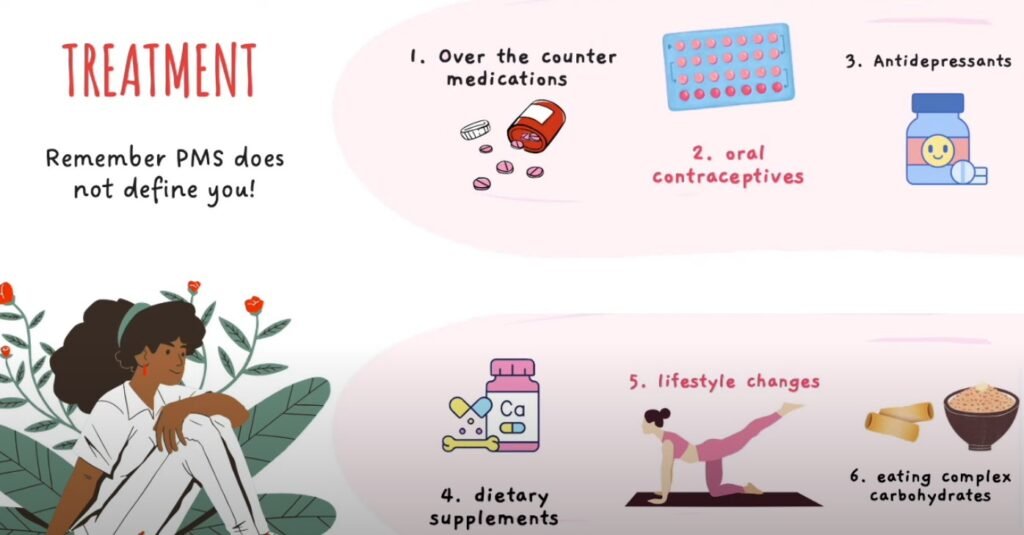
Natural Real Treatment for (PMS)
- Treatment depends on the severity of the symptoms. Where cal mild symptoms are experienced, the problem can be alleviated by a change of routine. Stressful circumstances and more labor have to be avoided. Fluids should be moderately restricted and care should be taken not to add extra salt to the food. The patient’s partner and family members should be educated about all the facets of the PMS. The patient should cor take any oral contraceptives as these may cause fluid recention and lowering of plasma levels. A natural eating plan can help with uterine infections and hormonal imbalances.
- As most women feel tension arising from chronic constipation, it is essential to treat this condition first. In constipation, the putrefying faecal matter may be reabsorbed into the bloodstream, and the same blood, if supplied to the brain, will cause gradual enervation. Constipation can be relieved by a lukewarm water enema and liberal intake of seasonal fruits and vegetables and simple fibrous meals.
- Other treatment for the PMS include regular cold hip baths for 10 to 15 minutes twice a day. This will relieve congestion and inflammation of the uterus and the connected organs.
- Tension will also be dissipated with this treatment. Uterine congestion and tension can also be relieved by taking hot foot baths and then applying a cold compress to the inside surfaces of the thighs and lower abdomen.
- If the cold hip bath is not practicable, a wet girdle pack applied twice a day on empty stomach is very beneficial for clearing up uterine congestion and improving bowel works.It is best to stop all of these therapies when a woman is menstruating.
- Diet plays a significant role in preventing premenstrual syndrome, The patient should avoid refined carbohydrates, sugars, coffee, tea, tobacco, other stimulants, oily, fried or spicy food and all meats.
- recommended for strengthening the genito-urinary system will be very useful in overcoming premenstrual syndrome. These asanas are bhujangasana,
- paschimotanasana, ardhamatsyendrasana and trikonasana. Exercises that strengthen the abdominal muscles and pelvic organs, such as brisk walks, are additional beneficial interventions. Great relief can also be obtained by manipulating the tender points gently, on the big as well as other toes of the feet.
- Manipulation on the middle portion of the left foot which relates to the uterus and vagina will help to correct the disorder of the uterus.
- Mental poise is an important factor. Negative mental attitudes like fear, worry, anger, jealousy, tension and inferiority complex should be eliminated by positive thinking, meditation and good company.
Supplements for PMS: 7 Ways to Treat Mood Rolls and Other Symptoms
Premenstrual syndrome (PMS) is an unwelcome visitor for many individuals each month, bringing along a variety of physical and psychological symptoms. Bloating, headaches, mood swings, and anxiety are just a few of the challenges that PMS can present. But fear not, as there are natural supplements that may offer relief without the side effects associated with traditional treatments.
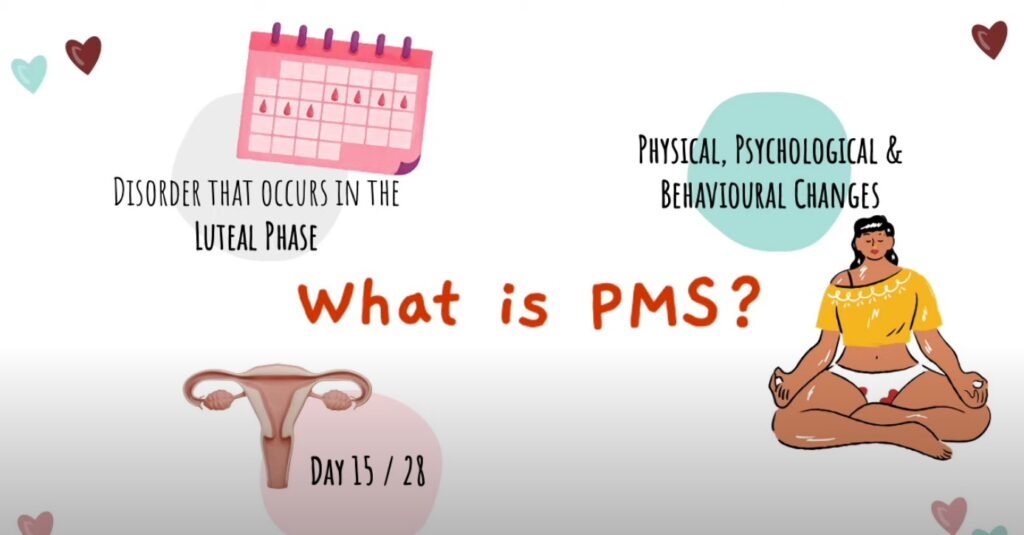
What is PMS?
PMS typically begins about a week before menstruation and fades within four days of its onset. While the exact causes are not fully understood, hormonal fluctuations, particularly in estrogen and progesterone levels, are believed to play a significant role.
FAQs:
- What is the difference between PMS and PMDD? PMS involves a range of symptoms that may disrupt daily life, while PMDD is a more severe form of PMS, characterized by intense symptoms that significantly impact daily activities.
- How common is PMS? PMS affects many menstruating individuals, with symptoms varying in severity.
- Can PMS be managed without medication? Yes, natural supplements and lifestyle changes can help alleviate symptoms for some individuals.
1. Chasteberry
Chasteberry is renowned for its benefits in female reproductive health. It has been shown to alleviate physical symptoms like bloating and headaches, often more effectively than traditional antidepressants for these issues.
How to Take: Follow the manufacturer’s dosage guidelines.
Safety: Consult with your doctor, especially if you have hormone-sensitive conditions or are taking oral contraceptives.
2. Calcium
Many individuals with PMS have inadequate calcium intake, which can worsen symptoms. Calcium supplements have been found to reduce symptoms like bloating and fatigue, as well as psychological symptoms such as mood swings and anxiety.
How to Take: Start with 500 mg per day and adjust as needed.
Safety: Watch for constipation with higher doses and consult your doctor if you take other medications.
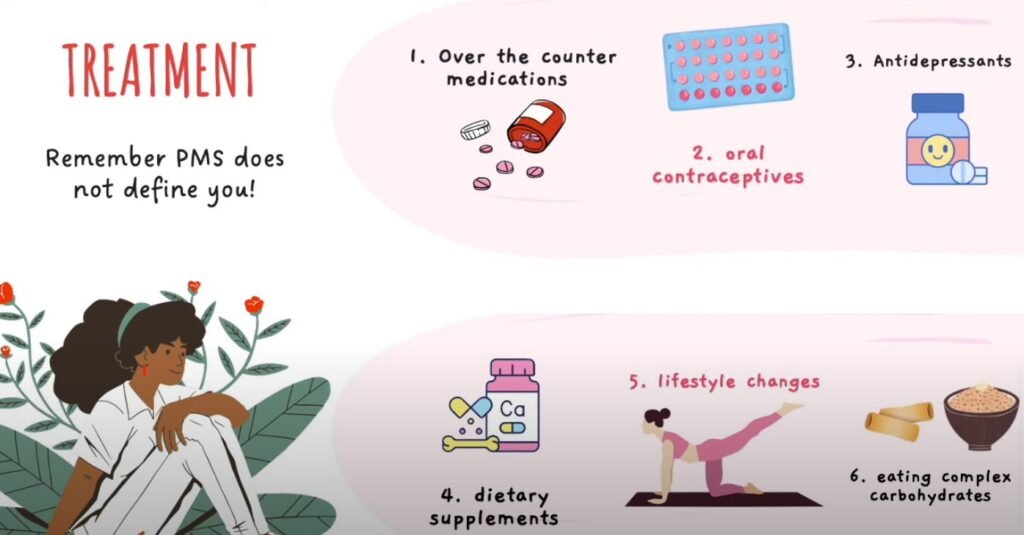
3. Vitamin B-6
Vitamin B-6 is crucial for mood regulation, and supplementation may help alleviate moodiness, irritability, and anxiety associated with PMS.
How to Take: Aim for 50-100 mg per day, following manufacturer instructions.
Safety: Avoid if taking certain medications like cycloserine or anti-seizure drugs.
4. Magnesium
Low magnesium levels may exacerbate PMS symptoms. Supplementation, especially when combined with vitamin B-6, can ease symptoms like depression, anxiety, and breast tenderness.
How to Take: Take 200-250 mg per day, considering dietary intake.
Safety: Discuss with your doctor, especially if taking medications like diuretics or antibiotics.
5. Essential Fatty Acids
Certain fatty acids, such as gamma-linoleic acid, have anti-inflammatory effects that may benefit PMS symptoms. Evening primrose oil, rich in these fatty acids, has shown promise in reducing symptoms.
How to Use: Follow manufacturer recommendations for dosage.
Safety: Consult your doctor, especially if taking blood thinners or antipsychotic medications.
6. Ginkgo Biloba
Known for its memory-enhancing properties, ginkgo biloba may also help with PMS symptoms, reducing both physical and psychological discomfort.
How to Use: Start with the lowest recommended dose and adjust as needed.
Safety: Exercise caution, especially if taking medications or if you have a history of seizures.
7. St. John’s Wort
St. John’s wort, often used as a natural antidepressant, has shown effectiveness in easing both physical and emotional symptoms of PMS.
How to Use: Follow dosage recommendations, avoiding prolonged use.
Safety: Discuss with your doctor, especially if taking antidepressants or other medications.
Takeaway
While PMS may feel like an unavoidable part of life, natural supplements offer a promising avenue for relief. However, always consult with your healthcare provider before starting any new supplement regimen, especially if you have underlying health conditions or are taking medications. With patience and the right approach, managing PMS symptoms naturally can lead to a more comfortable menstrual experience.

Frequently Asked Questions (FAQs)
- How can I differentiate between normal mood swings and PMS symptoms?
- PMS symptoms typically recur cyclically before menstruation and are more severe than regular mood swings.
- Are there any dietary supplements recommended for managing PMS?
- Vitamin E and vitamin B supplements may help alleviate PMS symptoms, but consult a healthcare professional before starting any new supplements.
- Can regular exercise reduce the severity of PMS symptoms?
- Yes, engaging in regular exercise, particularly yoga and abdominal exercises, can help alleviate PMS symptoms and improve overall well-being.
- Is it advisable to seek medical help for severe PMS symptoms?
- Yes, if PMS symptoms significantly interfere with daily life or mental health, consulting a healthcare provider for personalized treatment options is recommended.
- Are there any specific relaxation techniques that can help with PMS?
- Yes, practices such as deep breathing, meditation, and progressive muscle relaxation can help reduce stress and alleviate PMS symptoms.
